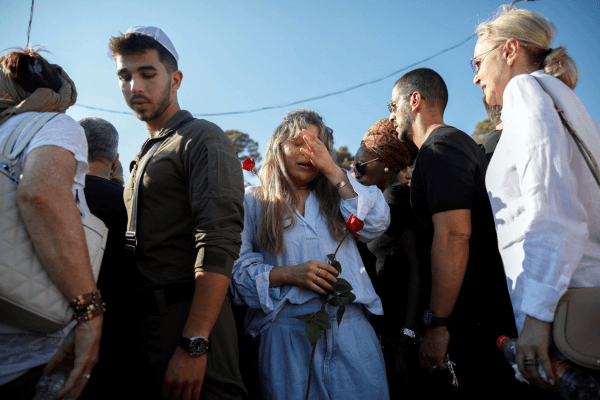We all are shocked by Hamas’ horrific, inhumane attacks on the people of Israel, which killed more than 1,000 people, according to recent estimates. Israel’s retaliatory airstrikes have killed at least 1,000 more; thousands of people on each side are wounded. In both Israel and Gaza, innocent civilians are bearing the brunt in this latest round of indiscriminate, militarized lethal violence — violence that will solve nothing and only further entrench mutual mistrust, hatred, and the thirst for vengeance.
Violence begets violence
First, we must renounce violence — all violence, from all perpetrators, for any cause, without exception. It always sounds foolhardy to appeal to nonviolence in the face of wanton and morally depraved terror, yet this is the message of the gospel. Further, what we see happening in Israel, Gaza, and beyond demonstrates what happens when we use weak and irrelevant arguments to justify violence; violence begets violence.
We will see more innocent bloodshed in the coming days. Israel will try to completely crush Hamas, with continued airstrikes and its “complete siege” of the 2 million people of Gaza (nearly half of whom are children) that prohibits anyone or anything — including food, water, and electricity — from entering the area.
Yet whatever the immediate outcome, no degree of military ferocity will permanently crush Palestinian aspirations. The hard truth is that in the long term, there is no military solution to the Israeli-Palestinian conflict. Palestinian armed factions can never defeat Israeli armed forces that are backed by ongoing, unequivocal support from the U.S. Nor can Israeli military power ever impose a lasting solution to the Palestinian-Israeli conflict. Until both sides and the international community embrace these truths, this awful cycle of violence will continue for years ahead.
Continuing to go down this hopeless path that will lead us all to ruin. It must stop.
Reject nationalistic religion
The biblical prophets called for radical inclusion of the outsider, challenging the narrow nationalistic righteousness bred by an exclusive understanding of whom God favored. God’s covenant — frequently broken by the unfaithfulness of God’s people — was prophetically and continually redefined to reach even wider than what was normally imagined. God’s blessing on the people of Israel was linked to its treatment of the foreigner, the stranger, and the outsider; offering a prophetic word today holds forth that calling for any people, toward all people.
No political leaders holding power in the Israeli or Palestinian governmental bodies offer any vision for a viable, peaceful future for their peoples, living together on this narrow stretch of land that many still call holy. The Palestinian Authority, the governing body that manages parts of the West Bank, has lost credibility from its constituency and clings to undemocratic power, refusing elections. Hamas, the radically militant group in charge of the Gaza Strip, is governed by an ideology of violence and hate that justifies terror. Israeli politics are held hostage to extremist groups building their base through the flagrant denial of the humanity and rights of Palestinians. In the long run, hopes for peace require the creation of civil and political space in these societies that will eventually allow fresh and courageous voices to emerge into new leadership.
Political leaders in the U.S. suffer a similar lack of imagination. When the missiles, bombs, and bullets fueled by incendiary rhetoric eventually cease by some mutual or imposed ceasefire, will we continue to offer a blank financial check, with our unquestioning moral and diplomatic backing, to Israel? Or will this nation acknowledge that a truly secure and viable future for the State of Israel and the Jewish people requires a future vision that fully recognizes the rights, the humanity, and the political embodiment of its Palestinian neighbors and citizens? And will our influence be governed by that goal?
God's presence in ‘the other’
Finally, a Christian witness to unspeakable violence recovers the most radical, counter-cultural truth of all, which always is repressed in such onslaughts: the presence of the image of God, resting at the heart of every person, beneath all else that would cover or blaspheme it. Always, at the heart of the “other,” the image of God is there. In the end, our addiction to violence violates God, whose love remains linked to all that God has created.
The ironic tragedy is that many of the people engaged in either side of this horrific conflict — people who pledge their fidelity to the God they worship as holy — deny any semblance of God’s presence in the other, sanctioning their acts of devastation. Yes, Christians should plea for pragmatic measures to bring a cessation to hostilities, weaving resolute understandings of justice into proposals for lasting peace. But the witness of Christians should speak the most foundational and radically clear truths of our faith: the irrevocable image of God in every person, the prophetic calling to inclusion mirroring God’s love, and the way of uncompromised nonviolence demonstrated in the life of our Lord.
Got something to say about what you're reading? We value your feedback!






